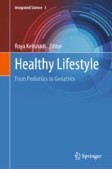Search
Search Results
-
Is there crosstalk between circadian clocks in plants and the rhizomicrobiome?
Circadian clocks occur across the kingdoms of life, including some fungi and bacteria present in the root-associated soil known as the rhizosphere....

-
Adding intrinsically disordered proteins to biological ageing clocks
Research into how the young and old differ, and which biomarkers reflect the diverse biological processes underlying ageing, is a current and...

-
An evaluation of aging measures: from biomarkers to clocks
With the increasing number of aged population and growing burden of healthy aging demands, a rational standard for evaluation aging is in urgent...

-
Microbial circadian clocks: host-microbe interplay in diel cycles
BackgroundCircadian rhythms, observed across all domains of life, enable organisms to anticipate and prepare for diel changes in environmental...

-
Toward an improved definition of a healthy microbiome for healthy aging
The gut microbiome is a modifier of disease risk because it interacts with nutrition, metabolism, immunity and infection. Aging-related health loss...

-
The Microbiome of Coastal Sediments
Coastal zones are among the most productive marine environments and many are highly impacted by anthropogenic activity. Coastal zones are key regions...
-
Insights into the Evolution of Circadian Clocks Gleaned from Bacteria
Circadian clocks are ubiquitous throughout the Tree of Life, being present in organisms from bacteria to mammals. These clocks are generally thought...
-
Basic Biology of Rhythms and the Microbiome
The mammalian microbiome undergoes diurnal oscillations in composition and function throughout a 24-period that are regulated by host clock and...
-
Long-term dynamics of the human oral microbiome during clinical disease progression
BackgroundOral microbiome dysbiosis is linked to overt inflammation of tooth-supporting tissues, leading to periodontitis, an oral condition that can...

-
The Bacterial Perspective on Circadian Clocks
Prokaryotes were long thought to be incapable of expressing circadian (daily) rhythms. Research on nitrogen-fixing cyanobacteria in the 1980s...
-
Disease Implications of the Circadian Clocks and Microbiota Interface
Circadian rhythms are closely tied to and regulate a variety of host physiologic functions (e.g., sleep-wake, immune function, metabolism). Emerging...
-
Epidemiology, Genetics and Epigenetics of Biological Aging: One or More Aging Systems?
Vast progress was made in the last decade in the development of markers of biological agingBiological aging (BA)—namely estimators of the discrepancy...
-
Immunological and inflammatory effects of infectious diseases in circadian rhythm disruption and future therapeutic directions
BackgroundCircadian rhythm is characterised by daily variations in biological activity to align with the light and dark cycle. These diurnal...

-
Daily fluctuation of colonic microbiome in response to nutrient substrates in a pig model
Studies on rodents indicate the daily oscillations of the gut microbiota have biological implications for host. However, the responses of fluctuating...

-
Accelerated epigenetic aging and inflammatory/immunological profile (ipAGE) in patients with chronic kidney disease
Chronic kidney disease (CKD) is defined by a reduced estimated glomerular filtration rate (eGFR). This failure can be related to a phenotype of...

-
Intermittent Fasting Regulates Metabolic Homeostasis and Improves Cardiovascular Health
Obesity is a leading cause of morbidity and mortality globally. While the prevalence of obesity has been increasing, the incidence of its related...

-
Measuring healthy ageing: current and future tools
Human ageing is a complex, multifactorial process characterised by physiological damage, increased risk of age-related diseases and inevitable...

-
Machine learning methods for microbiome studies
Researches on the microbiome have been actively conducted worldwide and the results have shown human gut bacterial environment significantly impacts...
-
Circadian rhythms in the plant host influence rhythmicity of rhizosphere microbiota
BackgroundRecent studies demonstrated that microbiota inhabiting the plant rhizosphere exhibit diel changes in abundance. To investigate the impact...

-
Lifestyle Genomic interactions in Health and Disease
There has been increasing interest in how lifestyle may have an impact on genomics. Nutrition, physical activity and other environmental factors are...
